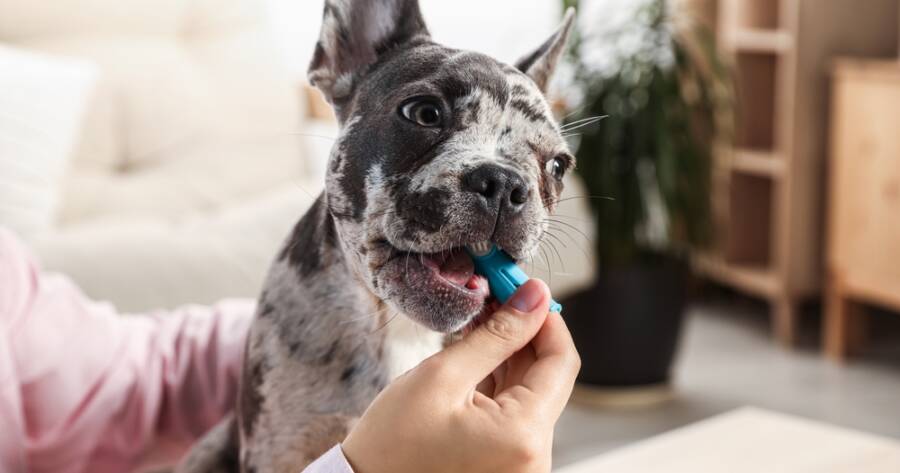Your dog’s wagging tail and happy bark might steal the spotlight, but what’s going on in their mouth deserves just as much attention. Dental health is often overlooked in dogs, yet it plays a vital role in their overall well-being. Bad breath is more than a nuisance. It could be a sign of gum disease, tooth decay, or even underlying health issues! Caring for your dog’s teeth isn’t just about fresh breath, it’s about protecting their quality of life.
The Hidden Dangers of Poor Dental Hygiene
It’s easy to overlook your dog’s dental health, especially when they’re still eating, playing, and acting normally. But beneath the surface, plaque and tartar buildup can quietly lead to serious problems. Gingivitis, tooth decay, and periodontal disease are common in dogs and can go undetected until advanced stages, often causing pain and infection without visible symptoms.
Left untreated, these conditions can lead to tooth loss and damage to internal organs. Bacteria from the mouth can enter the bloodstream and affect the heart, kidneys, and liver. That’s why regular dental care isn’t just about the mouth, it’s an important part of your dog’s overall wellness. Taking preventive action can add years to their life and comfort to their days.
Bad Breath Isn’t Normal—It’s a Red Flag
Many pet parents chalk up stinky dog breath to being “just a dog thing,” but persistent foul odor can be an early sign of dental disease. When bacteria accumulate on the teeth and gums, they produce compounds that create bad breath. If your dog’s kisses come with a strong smell, it’s time to look closer.
Halitosis may indicate infections, abscesses, or even systemic issues. Don’t wait until your dog shows signs of pain, such as pawing at the mouth or refusing to eat hard food. Catching dental issues early gives you a better chance of treating them with simple interventions, rather than needing costly procedures down the road. Fresh breath is more than pleasant—it’s a sign of health.
How Dental Disease Impacts Overall Health
Dental disease doesn’t stay confined to your dog’s mouth. The inflammation and infection caused by periodontal disease can have widespread effects. Once harmful bacteria enter the bloodstream, they can damage major organs and contribute to chronic conditions, especially in older dogs or those with underlying health issues.
The immune system also stays in a state of constant alert, which puts strain on the body. This can accelerate aging, reduce energy, and compromise your dog’s natural ability to fight off illness. By managing dental health, you’re supporting your dog’s immune function and protecting their vital organs. It’s a simple step with major benefits for long-term health and vitality.
Signs Your Dog Might Have Dental Problems
Dogs are skilled at hiding discomfort, so it’s up to owners to spot the signs of dental trouble. Common red flags include bad breath, red or bleeding gums, yellow or brown buildup on teeth, and difficulty chewing. You might also notice behavioral changes like increased irritability or disinterest in toys that require biting.
In more serious cases, dogs may drool excessively, drop food while eating, or paw at their mouth. Any of these symptoms should prompt a visit to your veterinarian for a dental exam. Routine checks and cleanings help catch issues early before they become painful or costly to treat. Paying attention to the small signs can save your dog from big problems.
At-Home Dental Care: Small Habits, Big Impact
Brushing your dog’s teeth may sound intimidating, but with a little patience and the right tools, it becomes a manageable (and essential!) part of your routine. Use a dog-specific toothbrush and toothpaste (never human toothpaste), and start slowly, aiming for a few times a week. The more consistent you are, the more your dog will adapt.
In addition to brushing, dental chews, water additives, and dental-friendly toys can help reduce plaque buildup. Some pet foods are even formulated to support oral health. While nothing replaces a good brushing, combining multiple strategies gives your dog the best chance at a healthy mouth. A few extra minutes each week can prevent years of discomfort and expensive vet visits.
The Importance of Professional Dental Cleanings
Even the most diligent at-home care can’t fully replace professional cleanings. Veterinarians have the tools and training to clean beneath the gumline and remove hardened tartar, which brushing can’t reach. These procedures are usually done under anesthesia, allowing for a thorough inspection of each tooth, and sometimes dental X-rays to detect hidden issues.
How often your dog needs a cleaning depends on their breed, age, and overall health. Small breeds, in particular, are more prone to dental issues and may require annual cleanings. Your vet can guide you based on your dog’s needs. Investing in professional cleanings now can prevent major health complications and help your pup stay happy and pain-free for years to come.
Keeping That Tail Wagging Longer
Dental health isn’t just about pretty teeth, it’s about your dog’s comfort, happiness, and longevity. A healthy mouth allows them to eat with ease, play without pain, and stay energetic throughout their life.
It’s one of the simplest, yet most overlooked, ways to care for your furry best friend. Regular brushing, routine checkups, and a watchful eye go a long way. When you care for your dog’s teeth, you’re truly helping them live their best life—tail wags and all!

